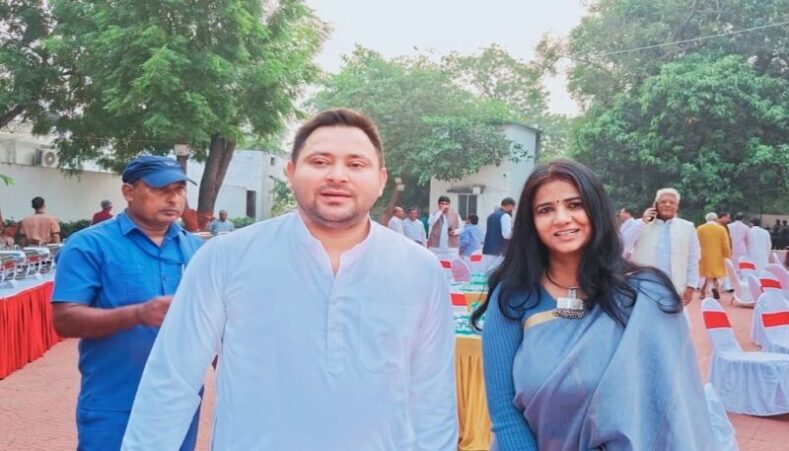
The political landscape in Bihar is facing increasing turmoil within the Grand Alliance, with significant internal conflicts emerging as the election season draws closer. One of the most prominent issues is the Rashtriya Janata Dal (RJD) grappling with dissatisfaction and rebellion regarding ticket distribution. Senior leader Ritu Jaiswal has become a vocal critic of the party’s decision to award the Parihar assembly seat in Sitamarhi to Smita Purbe, the daughter-in-law of Lalu Prasad’s close confidante, Ramchandra Purbe. In response to this decision, Jaiswal has decided to contest the seat as an independent candidate, a move that has added fuel to the fire of discontent within the RJD.
RJD Struggles with Ticket Distribution and Internal Dissent
The ongoing difficulties within the Grand Alliance to reach a consensus on seat sharing have now been exacerbated by open revolts from ticket aspirants within the constituent parties. Similar dissatisfaction was recently reported within the Congress party as well, where ticket distribution led to widespread frustration among potential candidates. However, the latest challenge to the alliance comes from within the RJD itself, where senior leader Ritu Jaiswal has taken a bold stand against the party leadership’s decision regarding the Parihar constituency.
Jaiswal, who has been a long-standing member of the party, was left disappointed after the RJD leadership chose Smita Purbe over her for the crucial Parihar seat. Purbe, the daughter-in-law of Ramchandra Purbe, a close aide to party president Lalu Prasad, was nominated for the seat. This decision has sparked outrage within the party, leading Jaiswal to take a public stand against what she perceives as an unfair move by the leadership.
Ritu Jaiswal’s Defiance: A Stand for Conscience and Loyalty
Ritu Jaiswal, in her message to the people of Parihar, made it clear that her conscience could not accept contesting the assembly elections from any constituency other than Parihar. She took to social media to express her stance and informed both the party leadership and her supporters of her decision. Jaiswal’s statement left no room for ambiguity, stating:
“My conscience does not accept contesting the assembly elections from any constituency other than Parihar. Therefore, I have clearly informed the party leadership that if the party does not change its decision due to any compulsion, I will contest the election from Parihar as an independent candidate.”
Jaiswal’s decision to go against the party’s ticket distribution has not only put the RJD in a difficult position but also poses a direct challenge to the party’s unity. With this public declaration, Jaiswal has made it clear that she will not accept the party’s decision and is prepared to take on the leadership. This move will likely divide the party’s vote bank in Parihar, a crucial constituency in Sitamarhi, and could significantly impact the RJD’s chances in the upcoming election.
A Divided Vote Bank: Challenges for RJD Ahead of the Elections
Ritu Jaiswal’s challenge to the RJD leadership and her decision to contest the elections as an independent candidate brings with it several complications. By choosing to contest against Smita Purbe, who has strong political ties within the party, Jaiswal risks splitting the vote bank, which could harm the party’s performance in the upcoming election. The Parihar constituency is seen as a significant battleground in the state of Bihar, and the division of votes could prove detrimental for the RJD, especially considering the increasing fragmentation within the Grand Alliance.
This rebellion highlights the deep dissatisfaction that has been brewing within the RJD regarding ticket distribution. Despite the party’s final decisions on who will represent them in key constituencies, the internal rifts continue to fester. The rebellion from Jaiswal is an indication that the process of candidate selection has not been entirely smooth and that several party members are dissatisfied with how the leadership has handled the process.
RJD’s Leadership Struggles to Maintain Unity
The timing of this internal revolt could not be worse for the RJD, as the party is already under pressure to maintain unity within the Grand Alliance. The alliance, which includes several constituent parties, has been struggling to finalize seat-sharing arrangements. The discontent in the Congress camp, as well as within RJD, suggests that there are deeper issues regarding trust, loyalty, and decision-making within the coalition. These tensions are likely to escalate in the coming days, further complicating the alliance’s ability to present a united front ahead of the elections.
Lalu Prasad Yadav, the RJD president, is now faced with the difficult task of managing the fallout from this rebellion. His ability to address the concerns of dissenting members like Ritu Jaiswal will be crucial in maintaining the party’s credibility and unity. However, given the strong emotions and deep-rooted dissatisfaction within the party, this may prove to be a challenging task for the leadership.
A Challenge to the Grand Alliance’s Unity
As the election season approaches, the challenge within RJD has cast a shadow over the unity of the Grand Alliance. The increasing number of internal conflicts within key parties suggests that maintaining cohesion within the alliance will be a monumental task. If the party leadership fails to address the concerns of its members, such rebellions could spread to other constituencies, further weakening the Grand Alliance’s chances in the polls.
The RJD’s internal struggle also highlights the broader challenges faced by political parties in Bihar. The state’s complex caste dynamics, along with the growing influence of regional players, have made seat distribution and candidate selection increasingly contentious. The rebellion within RJD is just one example of the difficult decisions that political parties must navigate as they attempt to balance the demands of various factions and maintain the support of their core voters.
The Role of Personal Relationships in Political Decisions
Another critical aspect of the controversy surrounding Ritu Jaiswal’s rebellion is the role of personal relationships within political decision-making. The selection of Smita Purbe, the daughter-in-law of Lalu Prasad’s close aide, Ramchandra Purbe, raises questions about the influence of familial and personal connections in the party’s ticket distribution. This has caused frustration among other senior leaders, including Jaiswal, who feel that the leadership’s decision was motivated more by personal ties than merit or loyalty to the party.
This issue of nepotism and favoritism within political parties is a recurring theme in Indian politics. The RJD’s internal conflict brings this issue to the forefront, with Jaiswal’s rebellion serving as a direct challenge to the party’s leadership and their approach to candidate selection. As the elections draw near, the party will have to address these concerns if it hopes to present a united front and avoid further divisions.
The Road Ahead for Ritu Jaiswal and RJD
For Ritu Jaiswal, the decision to contest as an independent candidate is a bold move that could reshape her political career. While it may give her the opportunity to establish herself as a leader who is willing to defy the party establishment, it also puts her at odds with the political machinery of the RJD. Contesting as an independent candidate in such a high-profile seat could provide her with the platform to build her political base, but it also carries the risk of alienating her supporters within the party.
For the RJD, managing this rebellion will be critical in the coming weeks. If the party fails to reconcile with Jaiswal and address the underlying issues, it could face more defections and challenges from other disgruntled members. The RJD leadership must find a way to manage internal dissent and restore confidence within the party if it hopes to maintain its position in the Grand Alliance and secure a strong performance in the upcoming election.
As the political struggle within the RJD intensifies, it reflects the growing challenges within the Grand Alliance ahead of Bihar’s elections. The rebellion led by Ritu Jaiswal over ticket distribution is just one example of the internal rifts within the alliance. With elections looming, the RJD faces a critical test in managing internal conflicts, maintaining unity, and ensuring that its candidates can effectively contest the polls. How the party handles this situation will play a significant role in determining the success or failure of the Grand Alliance in the upcoming elections.


